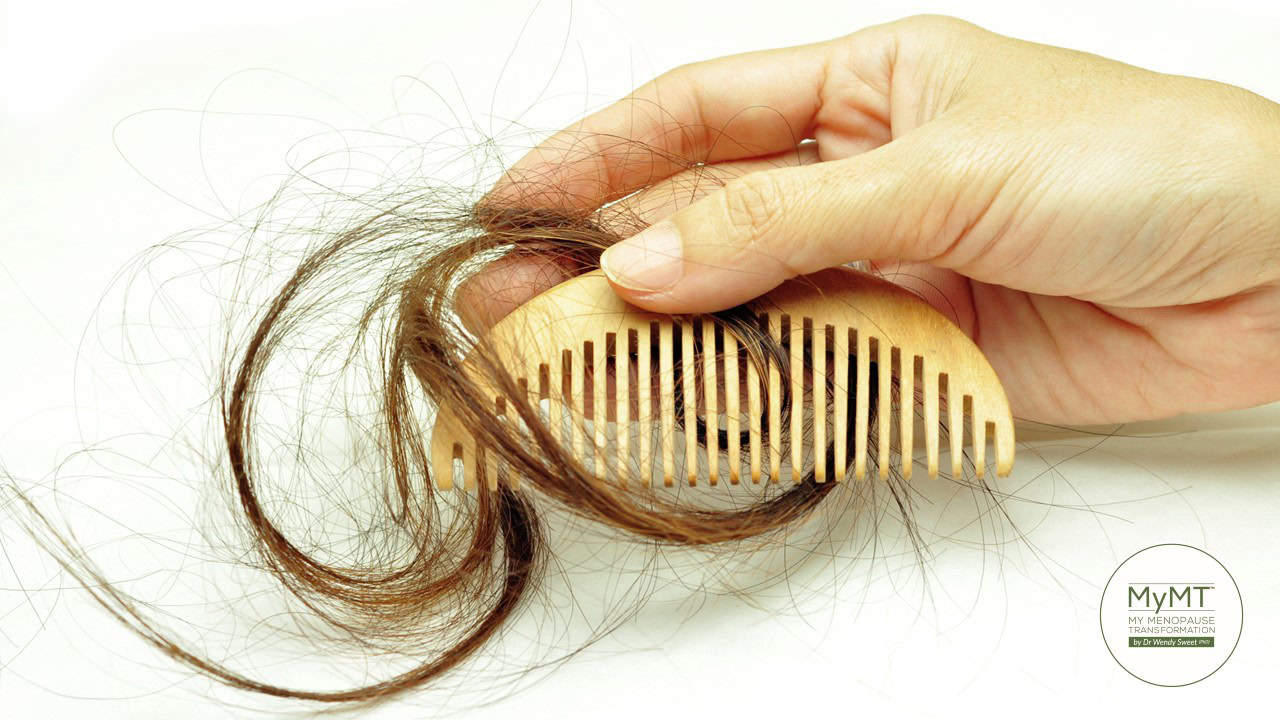The controversy at the Grammy award ceremony with actor Will Smith last month intrigued me. No, not because of him and his antics, but because of the topic that the entire stoush was about. Alopecia. Hair loss. The newspaper headlines were full of descriptions of alopecia. But there was one thing missing in every single article I read.
There was absolutely no mention of menopause.
As many of us have discovered personally, our hair is changing as our hormones change and numerous women arrive in their 50s to find that it’s not just the greying of the hair that’s the problem, it’s the thinning and loss of hair that is distressing too. That’s why I was intrigued with the news coverage at the time. Suddenly various Journalists had become experts in alopecia, however from what I read,
- There was no mention of how our hair starts to thin as we move through menopause.
- There was no mention of the chunks of hair that start to appear in our brushes and combs.
- There was no mention of how our hair follicles and scalp (which afterall is just skin) changes in menopause.
- There was no mention of the intimate relationship between our changing oestrogen and progesterone during menopause and hair thinning and/or hair loss.
- There was no mention of what happens to hair as women biologically age.
I know that there is enough anxiety about our menopause symptoms without worrying about hair loss too. However, during our menopause transition, with changes in our hormone status, one of the most common complaints for women is hair loss. It’s been talked about quite a bit in my private coaching community and with another conversation starting this week by some of the women, it reminded me that I needed to share some of the hair-loss research with you as well as my 5 Tips for Reducing Hair Loss in Menopause.
Firstly though, let’s talk about your ageing hair follicles.
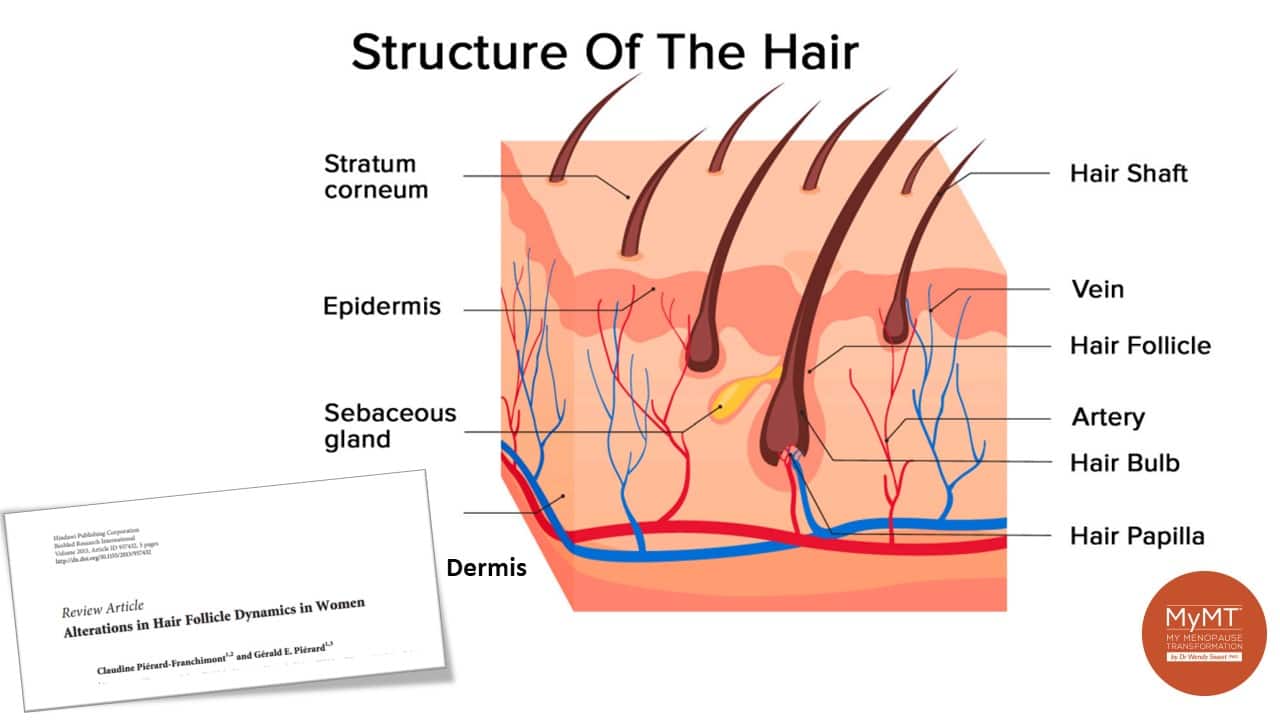
Whilst there is a wide range of hair complaints in women as they move through menopause, including a change of colour of the hair and for some, the loss of eyebrow hairs, your hair cycle is influenced by age and a variety of physiological factors.
We all know that changes in the colour of the hair are universal in ageing and this begins in midlife. And what is interesting, is that hair colour changes are not caused by the accumulation of grey hairs, but instead, by a loss of pigmentation in the hairs that remain on the head as melanin production declines with age. Melanin is a hormone that produces hair, eye and skin pigmentation.
The more melanin you produce, the darker your eyes, hair and skin will be. However, the amount of melanin in your body depends on various factors as you get older, including genetics, how much sun exposure your ancestral population had, your Vitamin D levels and your immune health. Afterall, your skin is your largest organ and therefore, plays an important role in protecting your immunity as you age.
So, please don’t despair if your hair is not only changing colour, but also starting to thin or fall out. Whilst this occurs as we age, the good news is that we can slow this down and stimulate renewed growth.
According to much of the hair-loss research, hair loss is influenced by numerous factors, including your immune health, your scalp health and of course, the stage of menopause you are in. Fluctuations and a decline in circulating levels of our reproductive hormones, oestrogen and progesterone affect hair growth patterns during menopause.
The two most significant patterns of changing hair, are
- Female pattern alopecia (FPA) and, if you hadn’t yet noticed,
- Facial hirsutism (increased hair growth on your face and chin) … if you’ve had to buy better tweezers for your chin hairs, then I’m with you on that one. And we aren’t alone – about 50% of women report excessive facial hair growth during and after menopause reports Pierard-Franchimont & Pierard [2020], which is due to higher levels of androgens.
Whilst androgens are mostly associated with male hormones, as we move towards post-menopause, the ovaries, adrenal glands, fat cells and skin cells also make the female body’s supply of androgens. For those of you who are overweight or have high levels of stress, these lifestyle factors may also influence the over-production of androgens. In turn, the increase in circulating androgens may affect hair changes in some women, including the increase in facial hair. Dietary changes help to reduce this as does lowering testosterone levels with the right type of exercise and stress management.
But what about our thinning hair and hair loss?
The hair cycle (normal production and turnover of hairs), as well as the structure of the hair follicle, are highly affected by various hormones, including oestrogen, progesterone and testosterone. There are also other influences, such as seasonal and environmental changes occuring throughout our life and dietary influences.
In most mammals, there are seasonal variations on hair thinning and loss and those of you with animals already know that there are hair cycle losses which happen in order to prepare the hair coat for seasonal environmental changes – our menopause transition is just a different type of cycle.
As such, in humans, whilst hair growth isn’t a continuous process, it does follow a rhythm, not only seasonally, but also over the life-course. There is periodic loss as well as regeneration of hair follicles and yes, this is controlled by hormones (Pierard-Franchimont & Pierard, 2020), as well by our dietary intake, sleep, stress levels and of course, any medical diagnoses and treatments, such as radiotherapy or chemotherapy.
For those of you who are troubled with hair thinning and loss that has arrived during your menopause transition, one of the first things to understand is that the connection between our sleep and hair quality during menopause is an important one.
Melatonin, the pineal gland hormone that regulates sleep, is a strong anti-oxidant and has long been known, particularly in animal-experiment based research and the wool-producing industry, to be a potent regulator hormone that influences hair growth, hair color and your hair cycle. [Fischer et al., 2008]. It’s production and secretion depends on light and dark periods, seasonal rhythms, environmental factors and reproductive rhythms.
Tip 1:
For many of you wanting to turn around hair thinning or hair loss and improve this during menopause, then start with your sleep – this is the time when your body is repairing and restoring.
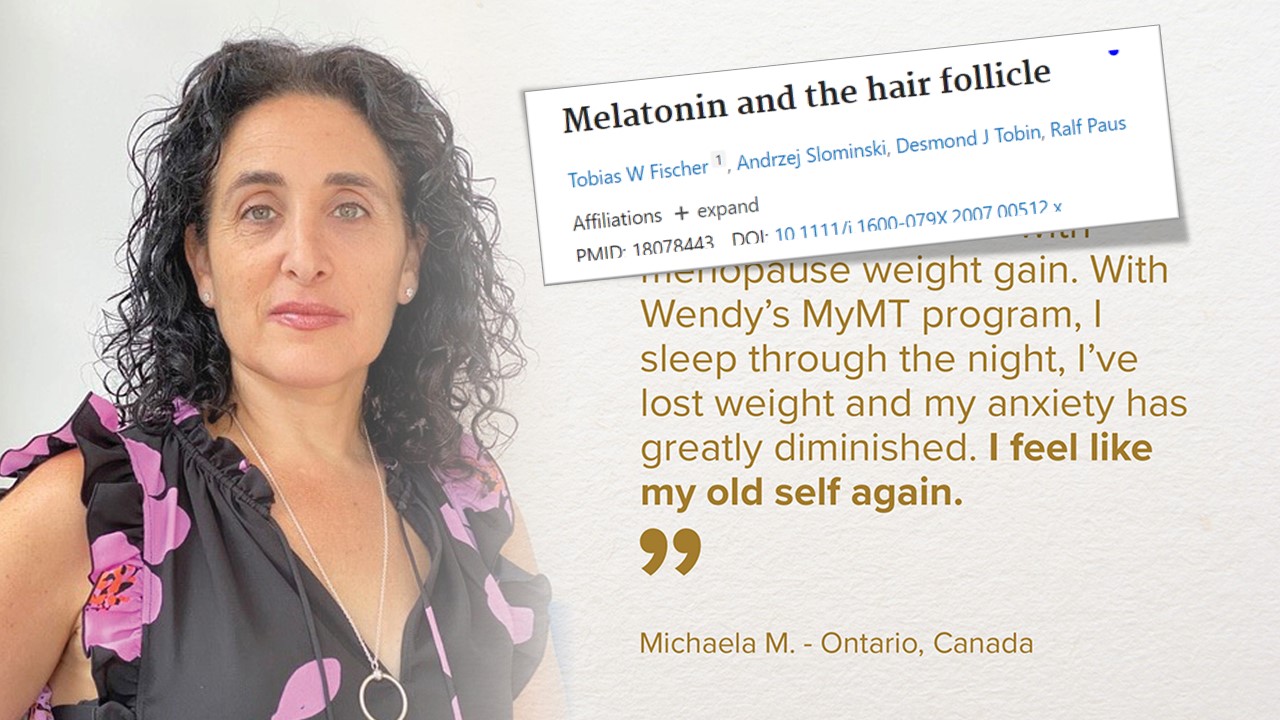
Most women in developed societies expect to spend a third or more of their lives after menopause. This is why we can use our menopause transition to change up a few things with our lifestyle. One of these is to ensure that we are getting the correct nutrients into us that help to reduce the rate of hair loss or thinning. Hence, my next hair-tip, has to do with nutrients.
Tip 2:
Your scalp (and skin) loves Vitamin C. Your scalp is covered in skin and in ageing females, the scalp shows striking structural and biological changes in the hair follicle environment that may impact hair growth. All skin layers, including the scalp show age-related changes in structure and functional capacity and like the rest of the human body, the skin is subject to changes caused by the process of natural ageing. Studies from the University of Otago here in New Zealand, suggest that Vitamin C may provide significant protection against these changes and regeneration of healthy
skin. [Pullar, Carr & Vissers, 2017].
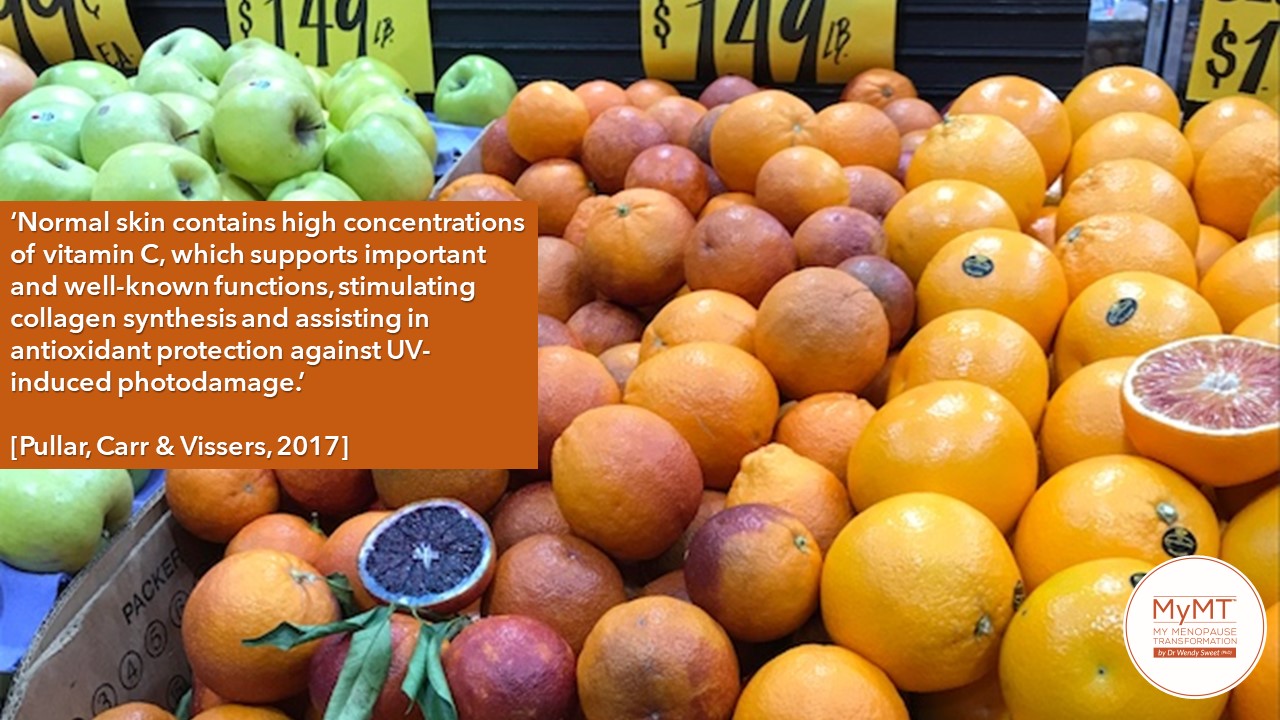
Tip 3:
Manage your minerals. Research on nutrition for hair loss suggests that the main minerals which influence hair growth are: Zinc, Iron, Selenium, Silicon, Magnesium and Calcium. [Goluch-Koniuszy, 2016]. I’ve written about Zinc in past articles as zinc takes part in the metabolism of carbohydrates, proteins and fats, and at the same time, influences hair follicles and hair growth. So, zinc is needed for building and regenerating hair, and according to Goluch-Koniuszy (2016), zinc also influences Vitamin A, which helps in building keratin. Without this interaction between zinc and Vitamin A, hair growth is suppressed and the hair becomes brittle and hair falls out.
Micronutrients are major elements in the normal hair follicle cycle, playing a role in cellular turnover, so iron is important to consider too. Iron deficiency has been associated with hair loss as in alopecia areata and androgenetic alopecia. I’m big on iron deficiency with women who are menstruating in peri-menopause and those who are doing a lot of exercise. When you can, get your iron levels checked as you transition menopause.
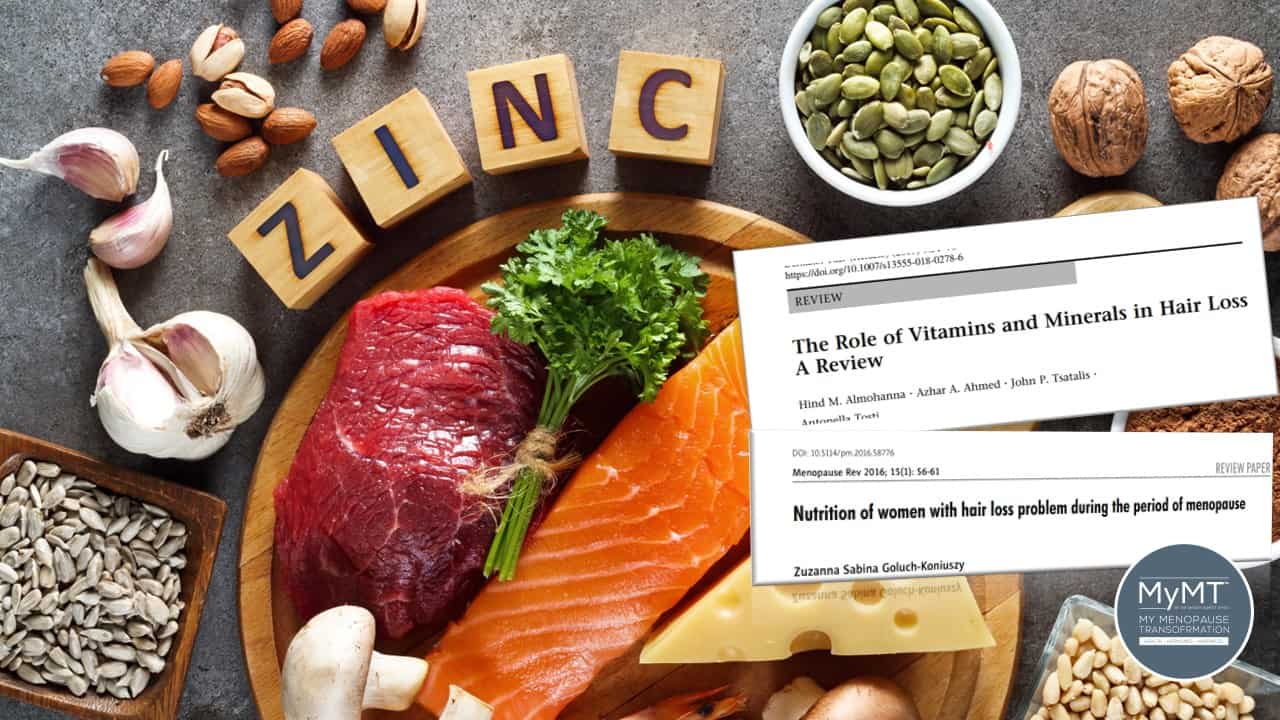
Tip 4:
The right fats are fabulous for your ageing hair and scalp. Cholesterol helps to make hormones and as such, we need some good quality fats in our diet to help our hair remain healthy. Fats present in the diet take part in steroid hormones synthesis (from cholesterol) so they influence the integrity of your hair. Extra Virgin Olive Oil has been used in hair care for milennia. I’ve written about the role of compounds in olive oil which take over from oestrogen on oestrogen receptors and our ageing scalp is the same.
Australia’s Olive Wellness Research Institute suggests that Extra Virgin Olive Oil (EVOO) for our health and our hair (re)growth is important. Natural antioxidants, vitamin E and phytosterols give EVOO its health benefits and oleic acid, which is the primary monounsaturated fat found in olive oil, is a natural cleansing agent (surfactant). Artificial surfactants are found in many shampoos and conditioners however, the monounsaturated oils in EVOO may penetrate the hair better than other oils. This may protect the hair from damage and help to soften the hair too. [Olive Wellness Institute, 2020).

Tip 5:
Your symptoms during menopause shouldn’t be viewed in isolation of each other. Age-related changes in the bodily systems occur throughout our menopause transition and changes in colour, thinning and loss of hair occurs as part of age-related processes. But these changes shouldn’t be looked at in isolation. We need to look at our diet, the nutrients that we absorb, our exercise, our stress levels, how we support our circulation and of course, the amount and quality of sleep that we get, in order to slow down these changes at the cellular level.
When we pull all of these factors together specific to the stage of life we are in, then the rate of ageing slows down. This is the goal for healthy ageing – we can’t stop it, or take a pill to prevent ageing, but we can slow down the inflammatory changes that are occuring around the body, including on the scalp and in our hair follicles.
That’s what you learn to do, on my 12 week coaching programmes. As I always say, menopause isn’t ‘just’ about hot flushes. It’s so much more than that and how we adapt our lifestyle specific to this life stage matters more than we think.
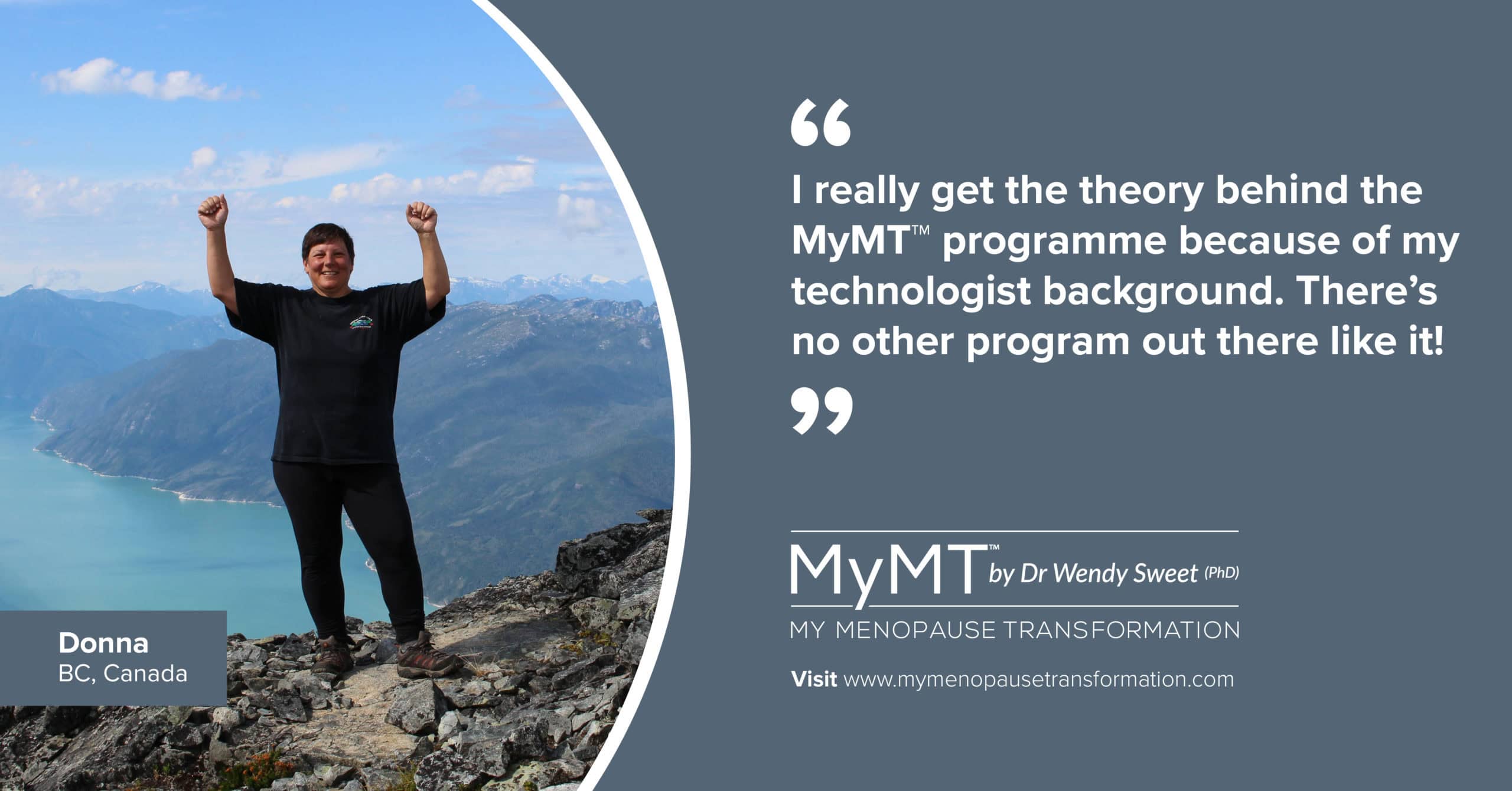
References:
Almohanna, H. M., Ahmed, A. A., Tsatalis, J. P., & Tosti, A. (2019). The Role of Vitamins and Minerals in Hair Loss: A Review. Dermatology and therapy, 9(1), 51–70. https://doi.org/10.1007/s13555-018-0278-6
Fischer TW, Slominski A, Tobin DJ, Paus R. (2008). Melatonin and the hair follicle. J Pineal Res. 44(1):1-15. doi: 10.1111/j.1600-079X.2007.00512.x. PMID: 18078443.
Grymowicz, M., Rudnicka, E., Podfigurna, A., Napierala, P., Smolarczyk, R., Smolarczyk, K., & Meczekalski, B. (2020). Hormonal Effects on Hair Follicles. International journal of molecular sciences, 21(15), 5342. https://doi.org/10.3390/ijms21155342
Olive Wellness Institute (2020). https://olivewellnessinstitute.org/article/olive-oil-for-healthy-hair-and-scalp/
Piérard-Franchimont, C., & Piérard, G. E. (2013). Alterations in hair follicle dynamics in women. BioMed research international, 2013, 957432. https://doi.org/10.1155/2013/957432
Pullar, J. M., Carr, A. C., & Vissers, M. (2017). The Roles of Vitamin C in Skin Health. Nutrients, 9(8), 866. https://doi.org/10.3390/nu9080866
Schwingshackl, L., Morze, J., & Hoffmann, G. (2020). Mediterranean diet and health status: Active ingredients and pharmacological mechanisms. British journal of pharmacology, 177(6), 1241–1257. https://doi.org/10.1111/bph.14778
